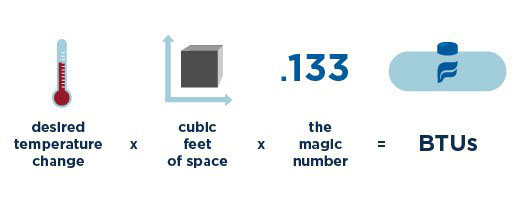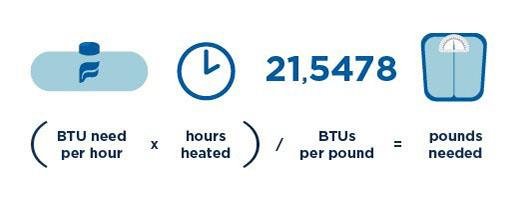How long can a propane heater run?
Propane is an affordable, reliable and clean fuel to heat your home, outdoor patio, or workspace – but it’s important to know some of the science behind heat so you’ll always have enough propane on hand to stay ahead of any weather. Heat production is measured in BTUs (British Thermal Unit), and calculating how long a propane heater will run requires an understanding of three things: 1. how many BTUs a heating source can produce 2. the square footage of the space being heated 3. the outside temperature.
How to calculate the amount of heat you need
A simple formula to determine your heating needs can be found in the image below:

For example, a 1,000 square-foot workspace with 8-foot ceilings means you’ll be heating 8,000 cubic feet of space. If the temperature outside is 30°F and you’d like it to be 70°F in your garage, the desired temperature change is 40°F. Those two numbers multiplied by .133 reveals you’ll need a little more than 42,500 BTUs per hour to keep your workspace at 70 degrees.
Once you know your heating needs, you can begin to get a sense of how many gallons of propane you’ll need to heat your space for as long as you want to heat it.
A 20-pound propane cylinder holds approximately 430,000 BTUs of liquid propane. Each gallon of propane contains 91,502 BTUs of potential heat and each pound contains approximately 21,548 BTUs. That means one 20-pound propane tank could heat that 1,000 square foot garage for more than 10 hours. For a standard Blue Rhino propane tank, which is 15 pounds, you would be able to get almost that same amount of heat. If you like formulas, and would like to calculate this for yourself, it will look like this:

How does my space affect the amount of propane I need?
The amount of propane you’ll need for your specific application will depend on variables such as changing outside temperatures, the size and setting of your heater, and whether your workspace is insulated or otherwise shielded from the outside.
Heating outdoor spaces - such as a deck or patio - presents additional challenges. Since the space is open to the elements, patio and portable heaters work to increase the ambient temperature of a limited area - rather than an enclosed space such as a garage or workspace. The most common patio heaters produce roughly 40,000 BTUs per hour - meaning a 20-pound propane tank will provide upwards of 10 hours of heat on the highest setting.
What are the benefits of propane heaters?
Propane is not only a lower emission and cleaner burning fuel than Kerosene and heating oil, it’s historically less expensive for consumers. It also produces more than twice the BTUs per gallon than natural gas, and generates substantially more heat than electric space heaters. Additionally, propane is always available and ready for use - either through an extensive network of distributors such as Ferrellgas who deliver to your at-home tank, or at retail tank exchange locations near you.
How to stay safe when using propane heaters
With any heating source, it’s important to be aware of safe operation. Propane heaters are generally identified for indoor or outdoor use, and heaters specifically rated for outdoor use - such as forced air and tank-mounted radiant heaters - present an increased risk of carbon monoxide poisoning if improperly used indoors.
Carbon Monoxide is a colorless, odorless gas that is produced from incomplete combustion. CO affects the body’s ability to move oxygen to the lungs, and CO poisoning often results in flu-like symptoms. Best practice is to use the right heater for the right space, ensure there’s adequate ventilation, and know the symptoms of CO poisoning. Most propane heaters come equipped with oxygen sensors that automatically shut down the heater before oxygen falls to dangerous levels. Some local authorities restrict the use of unvented heaters in living quarters so it is advisable to check with a reputable supplier or local authority having jurisdiction prior to purchasing or installing an unvented heater.
Tools and resources to find propane and propane appliances
To find the right propane heater for your needs, visit Ferrellgas reseller partners, such as Ace Hardware. Remember to consider your specific needs to find the style and size of heater that will provide your family with reliable comfort throughout the winter. And make sure you’ll never run low on fuel by visiting our propane finder tool - which can point you to the nearest refilling station or Blue Rhino tank exchange center.
CATEGORIES
Archives
- Summer 2025
- Spring 2025
- Winter 2024
- Fall 2024
- Summer 2024
- Spring 2024
- Winter 2023
- Fall 2023
- Summer 2023
- Spring 2023
- Winter 2022
- Fall 2022
- Summer 2022
- Spring 2022
- Winter 2021
- Fall 2021
- Summer 2021
- Spring 2021
- Winter 2020
- Fall 2020
- Summer 2020
- Spring 2020
- Winter 2019
- Fall 2019
- Summer 2019
- Spring 2019
- Winter 2018
- Fall 2018
- Summer 2018
- Spring 2018
- Winter 2017
